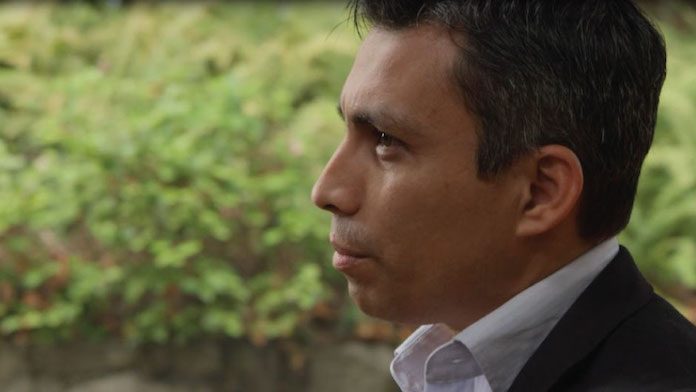Walter Mérida is a Professor in the Department of Mechanical Engineering at UBC. We asked everything from why he chose his field of study to what’s on his playlist in hopes of giving you a better understanding of what goes on outside the lab for one of the best minds in Canadian research.
What inspired you to become a scientist?
My father was a mechanic, and my grandfather was a carpenter. I grew up fascinated by figuring out how things work, and which tools to use to take things apart. However, it was my grandmother who inspired me to look deep into the world around me. For a woman with no formal education, she asked very profound questions (“How does fire actually work?”)
What do you like most about being a scientist?
I believe that scientists have walked around with augmented-reality vision well before Google came up with the concept. In high school, I wondered why rainbows are curved instead of straight. I obsessed over the puzzle, did some research, and when I finally figured it out, I never looked at sprinklers or morning dew in the same way. The physical world is beautiful as it is, and it is even more so if one understands what is going on. Scientists get to experience that. For free. All the time.
What do you envision in the future of your field?
History has recorded four grand energy transitions: from firewood, to coal, to oil, and more recently, to natural gas. Each transition has taken about a century, and at every step, our energy matrix has been decarbonized. We are now entering the fifth transition toward low- or zero-carbon, and the future energy system will be powered by electricity, hydrogen, and fuels which may actually remove carbon from the environment. The bad news is that we do not have a century to make the next transition, the good news is that faster innovation may be possible now.
In Paris, Canada championed an ambitious goal to keep global warming below 1.5 degrees Celsius, and the actual agreement to limit warming to 2 degrees is significant in its own right. However, what may be more significant is the emergence of three new entities: i) the Breakthrough Energy Coalition (led by Bill Gates), which aims to disrupt the normal cycles of innovation in energy technology, ii) Mission Innovation (an alliance of 20 countries including Canada), which will increase public investment in climate change solutions, and iii) a new climate change task force within the Financial Stability Board (announced by Canada’s own Mark Carney). The task force will assess corporate risk exposure to climate change. Hopefully, these developments represent a turning point in our society: thousands of years from now, the negative impacts of fossil fuels might be remembered as a short-lived, historical glitch.
How will your research make a difference in our lives?
Combustion engines have served us well, and combustion will be here for a while, but I hope to make a small contribution to the development of more elegant energy-conversion technologies that store electricity and sunlight in chemical fuels seamlessly. In the near term, car electrification (via batteries, fuel cells, and hybrid powertrains) will affect everyday life. Connected and autonomous vehicles may render ownership models obsolete (a process already under way with car-share programs), and new business and insurance models will emerge (“…your condo comes with a pool of shared vehicles in the garage…”). Consumer behavior may also change (“Yes dad, I know I am sixteen, but I don’t need a driver’s licence…”), and beyond the business and technological opportunities, the politics of energy will change. Unlike fossil sources, which are concentrated in a few regions of the world, hydrogen and electricity can be produced (in large quantities) from any available energy source. The barriers to regional energy independence, and global geopolitical stability may be removed.
What advice would you give young researchers?
Get out of the lab! Travel, read, hike, volunteer, fall in love – repeat. More pragmatically: identify the best professors on campus and get to know them personally (especially those outside your own discipline). Use their life experience to project and visualize your professional future. Even more pragmatically, get off campus: find mentors outside academia as early as possible. Science and technology are a very small part of the solutions that society requires. Politics, business, communication, and fashion are often more influential than the work we do in laboratories.
What do you consider your greatest achievement?
I am not sure if it was an achievement or just incredible good luck: I won a scholarship to the United World College of the Adriatic (in Italy) when I was seventeen. I met my future wife and people who are still the best of my friends. I also survived the mosquitoes while tree planting near Thunder Bay, but only Canadians will appreciate the extent of that accomplishment.
What do you read?
Favourite authors: Julio Cortázar, Gabriel García Márquez, Quino (I own the entire collection of Mafalda), Ungaretti, Octavio Paz, Neruda. Last book: “19Q4” by Murakami. Current book: “The Idea Factory” by Jon Gertner.
What’s on your Ipod?
Paolo Conte, Gustavo Cerati, Leonard Cohen, Valerie June, Bob Marley…
If you could meet any historical figure who would it be and why?
Leonardo da Vinci: imagine an engineer who could paint the Mona Lisa, and a painter who could design flying machines.
If you could do any profession other than your own what would it be?
Archeology maybe: I was born in Guatemala and I have always been fascinated by the Mayan culture.
What do you like to do for fun?
Whatever my eight-year old daughter decides is fun.
Want to learn more about Prof. Mérida’s research? Check out his Orange Chair Interview on fuel cells to power tomorrow’s technology.











































